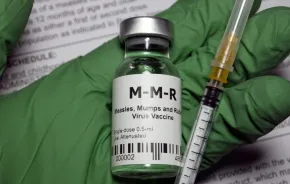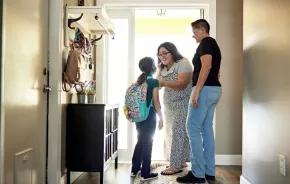On Saturdays, when many tweens can be found on soccer fields, plugged into their iPods or playing with video games, 12-year-old Nick Hall, his 7-year-old sister, Robin, and his mom, Jennifer Thames, are out restoring an urban forest in the West Duwamish Greenbelt with other volunteers.
Thames got her kids started young. She fondly recalls five years ago, watching her kids, then ages 7 and 2, help her load up day-old bread for the food bank at St. Mary’s in the Central District. The three have volunteered for several years for the Nature Consortium.
Nature Consortium director Nancy Whitlock says the organization’s Saturday urban forest restoration work parties emphasize fun and education, along with safety. Each workshop includes a forest ecology education component as well as tool-safety reviews. She says that the work parties provide an opportunity for families to accomplish something together. “They can plant 20 to 50 trees that can stand for more than 200 years,” Whitlock says.
Jenny Frank-Doggett of Tiger Mountain Counseling is an Issaquah counselor in private practice and a mother of two. She says the closer kids get to age 14, “the more difficult it is for families to connect, especially fathers to daughters and mothers to sons.” Late tweenhood is when she says, “children are attempting to establish an identity and desire social relationships separate from their parents.”
Volunteering together at this age is a way to stay connected, but it is something Frank-Doggett says older tweens may initially resist. “They will grumble initially, but with time, they appreciate it,” she says. “One positive advantage is seeing their parents role-model strong family values of service and connection to the greater community.”
Why get involved?
Frank-Doggett says that older tweens are often working on “identity issues,” and volunteering is a perfect opportunity for them to develop a sense of belonging and importance. “Volunteering and being a part of something larger than yourself is a crucial element of mental health for any age,” she says. Community involvement and contribution to a greater good is a tool that therapists sometimes suggest to help people get out of anxiety and depression. Volunteering also helps tweens pass an important developmental milestone for that age; Frank-Doggett observes that youth develop “a sense of belonging to something greater than themselves and their family unit.”
Getting started
Frank-Doggett suggests that before parents get started volunteering with their tween they interview the nonprofit organization they are considering to make sure it is a good fit for their family. She recommends parents talk with their children prior to volunteering, at their developmental level of understanding, about expectations and about difficult or disturbing issues that children may see. She points out that families should already be having conversations with their tweens about drugs, alcohol, homelessness and other tough human conditions that often bring clients to nonprofit organizations. She suggests parents teach, demonstrate and expect respectful behavior toward agency clients and other volunteers.
The holiday season is often a good time for families with tweens to get started volunteering together. Many local nonprofit organizations can use an extra hand during that time, and parents often have days off and kids are out of school. Janis Avery, the director of Treehouse, a Seattle organization that supports the needs of kids in foster care, says they welcome the help of families with tweens.
Tweens also like to raise money for causes, and allowing them to organize their own “drive” to meet a nonprofit’s needs might be a great way to engage. South Bellevue tween twins Jacob and Nathan Hunter have been asking their friends for unusual birthday presents since fifth grade: socks for Treehouse. For their 13th birthday they collected an impressive 1,300 socks. Their mom, Linda Hunter, says that she and her husband, Phil, are “big believers in responsibility for the bigger community” and observes that telling their sons wasn’t as effective as showing them society’s challenges and that “there are a lot of folks out there who need our help.”
Tweens will also be more motivated to volunteer if families do as the Hunters did and choose an organization that reflects the tween’s values and interests, says Frank-Doggett. “What you don’t want is the message of ‘I’m here because my parents forced me to be here,’” she says. She also cautions against making the volunteer activity an all-day event. “Limit the activity to one or two hours to start with. Keep it short and sweet so tweens will want to come back.”
Kathleen F. Miller enjoys volunteering with her husband and children. Her family participated most recently in the 2008 Bellevue Crop Walk to raise money for local hunger-fighting agencies as well as international relief and development efforts.
Resources
For parents of tweens who want to get started with volunteering as a family, here are two Web sites that offer extensive descriptions of volunteering opportunities with local nonprofit organizations:
If you are interested in volunteering at Treehouse, please call Shaunessy Jones at 206-767-7000.











